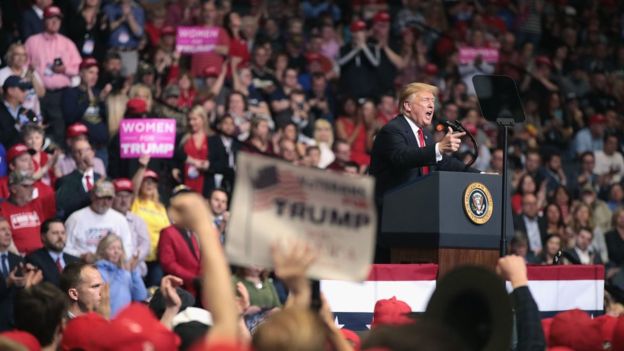At his first rally since the Mueller report was submitted, Donald Trump railed against his political opponents and reiterated his claim that the report was a “total exoneration”.
The report found no evidence of Russian collusion but did not exonerate Mr Trump of obstruction of justice.
In a typically free-form, 90-minute speech, Mr Trump used crude language to deride the two-year investigation.
He was speaking at a rally in Grand Rapids in the state of Michigan.
Warning: this report contains strong language
“After three years of lies and smears and slander, the Russia hoax is finally dead. The collusion delusion is over,” the president told a cheering crowd of thousands.
He called the special counsel investigation, led by former FBI director Robert Mueller, “a plan by those who lost the election to try and illegally regain power by framing innocent Americans – many of them, they suffered – with an elaborate hoax”.
Mr Mueller’s report was submitted on a week ago to the US Attorney General William Barr. After two days, Mr Barr released a four-page summary of the more-than 300-page report, which set out to investigate whether members of Mr Trump’s campaign team colluded with Russians to influence the election.
According to Mr Barr’s summary, Mr Mueller’s team did not establish that Trump campaign members colluded with Russians – a significant political victory for the president, who has lived for two years under a cloud of suspicion about alleged collusion.
After a period of uncharacteristic silence on the issue as Mr Mueller neared the end of his investigation, Mr Trump let loose this week in attacks on those who he saw as supporters of the investigation, as well as his Democratic opponents.
Speaking at the rally in Grand Rapids, he said: “These are sick people and there has to be accountability because it’s all lies and they know it’s lies.”
Using unusually crude language for a public appearance, he called the investigation “ridiculous bullshit”.
President Trump went on to repeat his claim that the report was a “total exoneration, complete vindication” – an expression which has jarred with some, given that Mr Mueller’s report explicitly stated that investigators were unable to exonerate the president of obstruction of justice.
The obstruction charge was a secondary plank of Mr Mueller’s investigation, alongside efforts to establish whether any collusion had taken place.
But Mr Mueller declined to draw a conclusion on whether Mr Trump had obstructed justice, saying only that the president could not be exonerated.
Attorney General Barr, who was appointed by the president, concluded in his summary of the report that there was not enough evidence to determine if the president had committed the offence.
Leading Democrats have called for the Mueller report to be published in full, and pledged to make use of the party’s majority control of House committees to continue investigating the president.
Despite the end of the Mueller investigation, Mr Trump still faces more than a dozen other criminal investigations and lawsuits looking into his businesses, family, and associates – including allegations that he instructed his former lawyer Michael Cohen to pay hush money to two porn stars over alleged sexual affairs.
Mr Cohen was sentenced in December to three years in prison. In all, six former Trump aides were indicted during the Mueller investigation, including his former campaign manager, Paul Manafort.
